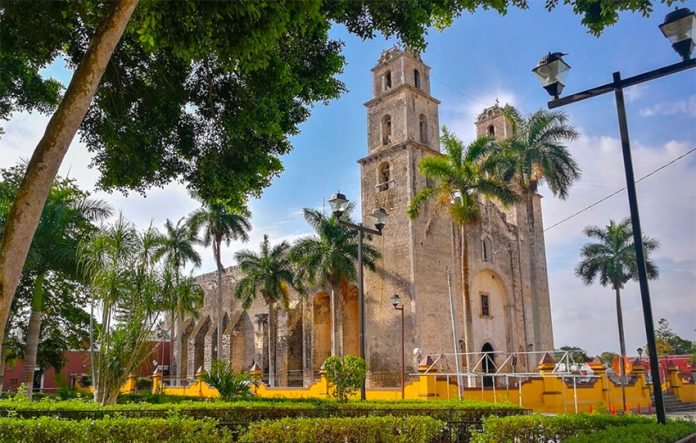The next few weeks look tough for the residents of the Yucatán. Those lucky enough to live far enough from the tropical climate of the southern states will be spared the classic heat of April and May, but as new reports this week suggest, the spike in temperature is about to be steeper and more suffocating than ever.
Yucatecos are being told to prepare for the mid-40s C and higher over the next week, in lockdown. They are also in the rare paradox of being unable, by law, to quench that sun-scorched thirst with an ice-cold beer; as much as we’ve heard the term “unprecedented times” over the last few weeks, it applies to few situations more appropriately than it does to this one.
On top of this, and in a continuation of current life insisting on imitating art, tempers in the Yucatán are rising with the temperatures. Having begun this saga in the strongest of moods, positive and encouraged by the resilience of the Mexican spirit, residents are beginning to display their restlessness with the current reality.
The world at large is sick of staying at home, hopeful for a quick off-ramp back to normality, and becoming increasingly sceptical of anyone who seems to be putting this at risk. The Yucatán is really no different, simply the latest victim to quarantine frustrations, but instances of conflict, violence, and civilians taking matters into their own hands raise further questions.
Something is different here. From Mérida to Campeche, Tulum to Cancún, the backbone of the peninsula’s economy is tourism. As this industry comes to terms with the ever-falling levels of demand, now and projected throughout the next year, many employees are having their hours cut back if they’re lucky, and if they’re not, being told that their services are simply no longer required.
Apart from the obvious economic repercussions on a personal level, broader worries about the displacement of these individuals are being voiced. The herd-like manner in which former employees of the tourism industry are forced into moving away from the cities and back to small towns across the region is aggravating already active tensions between populous and sparse communities along the peninsula.
Ever since the outbreak of coronavirus across Mexico, many civilians of rural areas have adopted a scepticism of those from densely populated towns and cities. These are often seen as breeding grounds for the virus, and in many cases across Mexico, small-town folk have been reported to bar travel to their communities from anyone leaving these large cities.
In the Yucatán, this scepticism isn’t just hypothetical: thousands of individuals are making the journey back to their hometowns to many an upturned nose. In Espita, Yucatán, a clash between locals and outsiders turned violent this week.
About 160 kilometers from Mérida, workers from cities in Quintana Roo, Tulum, Playa del Carmen, Cancún, and Cozumel have been arriving back in Espita to a reception that built into violent outrage this week. Residents of the small town described “thugs from Cancún” who clashed with the community, climaxing with a stoning assault on a local house, but details of the damage and participants are still disputed.
This incident, which led to the near destruction of the house of an elderly local, is just one outburst of violence instigated by the demographic shift of the southeast. For the past month, towns and municipalities have been autonomously closing their roads and borders to outsiders in order to curb the infection rate of Covid-19, but rates of outright conflict and violence have also been on the rise in parallel.
Despite increasing restrictions and the tightening of attitudes across the country, March was the bloodiest month in Mexico’s history. In light of this, one journalist suggested that successful quarantine wasn’t thanks to a fear of the virus as much as it was to the fear of bullets.
While a certain level of protectionism in communities is healthy for slowing the infection rate of coronavirus, rising tempers stray dangerously close to hostile and aggressive behaviours that only beget further hostility. Stresses and strains between communities and the cultural divides permitted by quarantine are all too easily etched into the fabric of “how we live now.”
A cursory look at some of the countries worst hit by the virus will confirm this. In the U.S., President Trump’s disregard of the advice of medical professionals, accompanied by his historic chastising of medical expertise, has enabled a bitter resentment of doctors and nurses. In the U.K. and across Europe, racism toward the East Asian community is on the rise and is further perpetuated by images in the media of specific ethnicities depicted in medical masks, coughing.
Coronavirus, and all its myriad implications, truly can bring people together, but resentment and misinformation left on its own trajectory has proven to be equally destructive.
There is of course no shame in recognizing the need to alter one’s personal actions as well as community mentality in the face of the coronavirus threat; the hope of carrying on as normal has long left our field of view.
But the true danger is in being held hostage to fears and in turn allowing divisions, that are to an extent necessary, to widen. As we’ve seen worldwide, and are beginning to see in our own backyard, these divisions left to their own devices threaten to define not only the legacy of coronavirus, but the legacy of how we coped.
Jack Gooderidge writes from Campeche.
